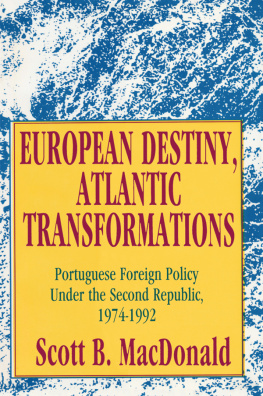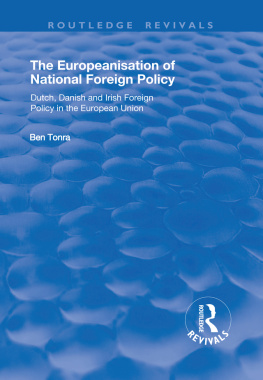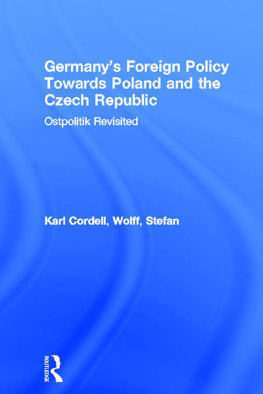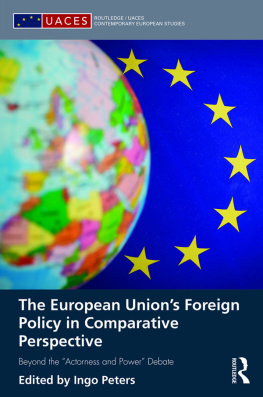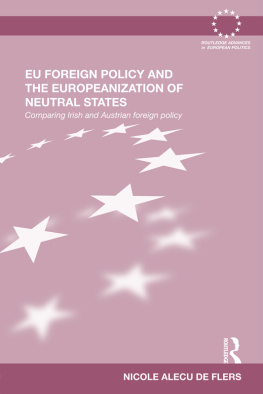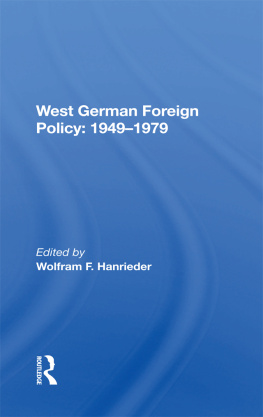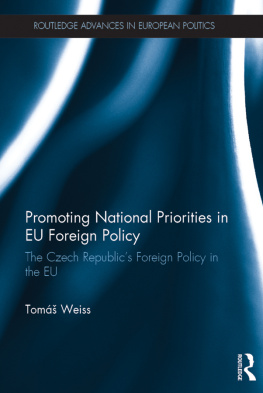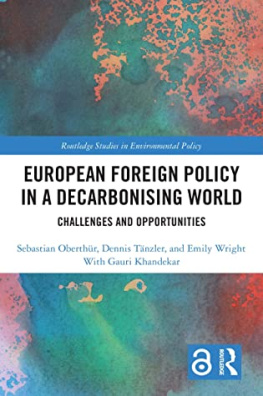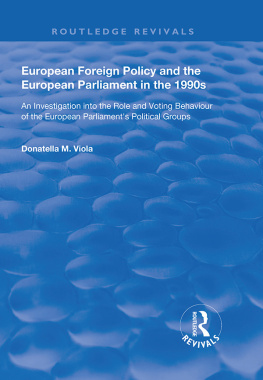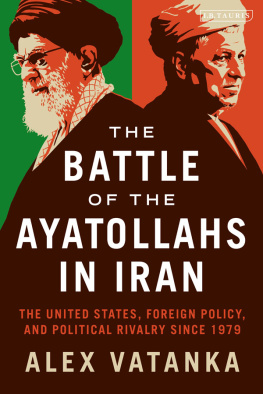EUROPEAN DESTINY, ATLANTIC TRANSFORMATIONS
First published 1993 by Transaction Publishers
Published 2019 by Routledge
2 Park Square, Milton Park, Abingdon, Oxon, OX14 4RN
52 Vanderbilt Avenue, New York, NY 10017
First issued in paperback 2019
Routledge is an imprint of the Taylor & Francis Group, an informa business
Copyright 1993 by Taylor & Francis.
All rights reserved. No part of this book may be reprinted or reproduced or utilised in any form or by any electronic, mechanical, or other means, now known or hereafter invented, including photocopying and recording, or in any information storage or retrieval system, without permission in writing from the publishers.
Notice:
Product or corporate names may be trademarks or registered trademarks, and are used only for identification and explanation without intent to infringe.
Library of Congress Catalog Number: 9220671
ISBN: 1560000783
Library of Congress Cataloging-in-Publication Data
MacDonald, Scott B.
European destiny, Atlantic Transformations : Portuguese foreign policy under
the Second Republic, 19741992 / Scott B. MacDonald.
p. cm.
Includes bibliographic references and index.
ISBN 1-560000783 $34.95
1. PortugalForeign relations1974 2. PortugalPolitics and government
1974 3. PortugalEconomic conditions1974 I. Title.
DP556.8.M33 1992
327.469009047dc20
9220671
CIP
ISBN 13: 978-1-138-50977-1 (pbk)
ISBN 13: 978-1-56000-078-5 (hbk)
This work is dedicated to the women in my life: my wife, Mari-Michele Kateri Scott-MacDonald; my mother, Anita B. MacDonald; my mother-in-law, Anne Scott; and my sisters-in-law, Alicia and Chris Scott. Between them, there are few places on the map left untouched, few subjects not discussed, and always something new and interesting. These include my wifes trips to Haiti (once as an election observer) and ongoing fascination with the French in the Americas and Mark Twain; my mothers expertise on Afghan and Latin American affairs and haute cuisine; my mother-in-laws Eastern European and Russian adventures and fine appreciation for the arts; Alicias travels through Asia and Africa and success in marketing in London and Paris; and Chriss achievements as Miss Luxembourg and French Finalist (in the New European Woman contest), while attaining her law degree. In all their accomplishments, they offer inspiration and support in the best of human spirit.
Portugal occupies an area in North American social science that is relatively understudied. While studies on Spain, Greece, and Italy have steadily multiplied through the 1980s and into the 1990s, a small handful of works on Portugal is available to English readers. Outside of the works of Douglas Wheeler, Jr., Kenneth Maxwell, Walter Opello, Jr., William Perry, Howard J. Wiarda, and Thomas C. Bruneau, Portuguese studies remain largely unknown. This particular work addresses a topic that has not been treated in any depth in previous studies. The foreign policy component of Portugals political and economic development is clearly an important element in understanding how that nation regards itself in the late twentieth century. It also provides insights on the nature of the enlargement process within the European Community (EC). Thanks to the relative success of the Second Republic since 1974 in deepening the democratic experience and unshackling the economy, Portugal now has a European destiny that encompasses its integration into the EC. At the same time, it maintains a role in the Atlantic community of the Americas, Europe, and Africa. This community is deeply affected by the end of the Cold War, the search for a new world order, and, in the South Atlantic, by economic and political reform. In the 1990s, it can be stated that Portugal has a European destiny that enhances its abilities to deal with an Atlantic community undergoing profound transformations in economic and political relations. The Portuguese experience also has much to offer developing countries, such as those in Latin America and in Eastern Europe, in terms of dealing with the difficult processes of democratization and economic liberalization.
Inspiration and assistance for this work came from a number of sources, including Amy Kaslow at the Christian Science Monitor; Norman Bailey, who struggled through one of the earliest drafts and was willing to tell it as he saw it; Howard Wiarda, one of the pioneers in Portuguese studies in North America; Mario Crispo, of RTP, Portuguese Television; his wife, Nora Crispo; and Dr. Ranbir Vohra at Trinity College who first introduced me to Chinese history and through that to the history of Macau. Special thanks are reserved for Dr. Albert L. Gastmann at Trinity College in Hartford, Connecticut, who has been a close friend since my student days. He provided a number of excellent ideas as the study progressed and was kind enough to take the time to discuss various chapters in detail. Apprecition is also extended to the Organization for Economic Cooperation and Development (OECD), the Commission of the European Communities, and the International Monetary Fund for permission to use their data. Part of the inspiration for this book also came from my first visit to Portugal in the summer of 1991, when I had the pleasure of walking a Portuguese bride down the aisle in Faro. For that experience I wish to thank my friends Uwe and Celia Bott. Additional thanks are extended to Linda Pfeifle for allowing me to interview her about her Department of State tenure in the Azores and to Maria Hernandez for her assistance with the first draft. Of course, appreciation is extended to my wife, Kateri Scott-MacDonald, for her stamina in editing and her ongoing patience with my many projects. While many hands helped to stir the creative pot that made this book, the ultimate responsibility is mine alone.
1
Introduction
Anyone who travels to the Cape of St. Vincent, called the Cabo de So Vincente by the Portuguese, cannot but be impressed by the rugged jut of land facing the crashing waves of the Atlantic Ocean. A lighthouse visited by tourists now marks this barren southwestern extremity of continental Europe. In a sense, the three-sided high promontory is symbolic of Portugal: a part of Europe, but facing out into the Atlantic. The dual European-Atlantic identity has left a clear imprint on the countrys long history. Only under the Second Republic, founded in 1974, has the European side come into ascendance.
On January 1, 1993, the European Community (EC) will have officially created a single market for the movement of goods, services, capital and labor. The post-1992 EC will be a market of 340 million people, with continental European frontiers stretching from the Polish border in the east to Ireland and Portugal in the west. Leading up this momentous time, Portugal will have assumed the presidency of the European Community in January 1992, and Lisbon will have housed the hub of activity that is coordinating the emergence of this economically powerful bloc. Portugal in the 1990s is well-suited to handle the challenges arising from a rapidly-changing Europe. This country of a little over ten million people has set the fastest pace for economic expansion within the EC for several years running, and the industrial base is rapidly diversifying. While the European connection is significant in the formation of contemporary Portugal, the small Iberian nation has another source of identity. From the 1400s to 1974 Portugal looked outwards to the Atlantic. In a sense, it faced away from Europe and established one of the worlds largest and most enduring empires, which at its height included large parts of Africa, South America, and Asia.

